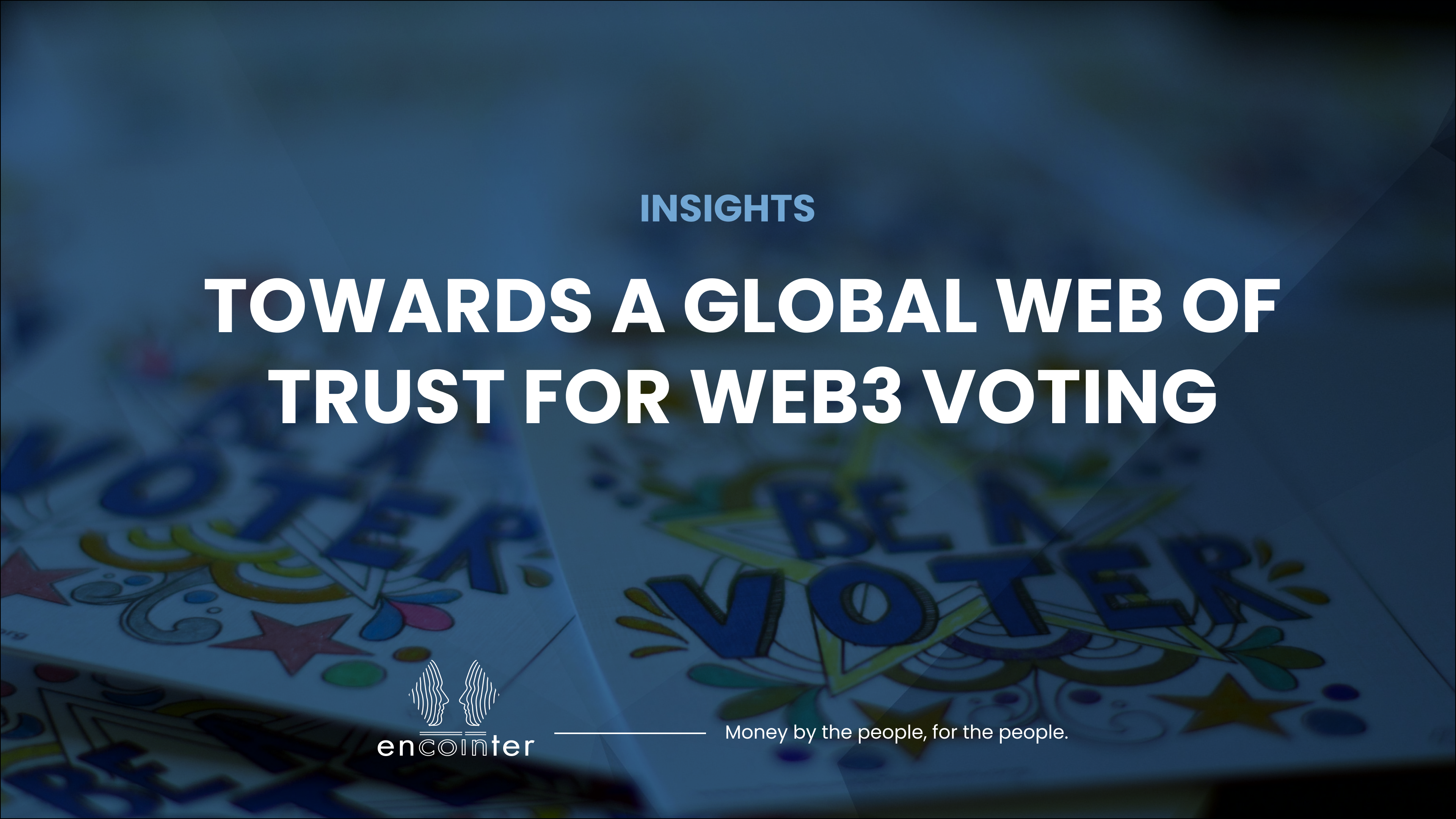Democratic ballots based on one person, one vote are difficult to conduct in the Web3 space. Encointer can provide proof-of-personhood at local level, but how can that be extended globally? A new research paper in collaboration with ETH Zürich explores the options, showing the path towards genuinely democratic Web3 voting mechanisms.
Digital voting — a hard problem, and not just for Web3
In an online environment full of hackers, bots, phishing attacks and fraud, we have become quite rightly cautious and skeptical about our digital interactions. Given the huge challenges that it poses in terms of security, verifiability and voter trust, e-voting has struggled to gain traction for national elections. At a time when almost every activity has been digitized, voting has become a peculiar outlier, remaining steadfastly wedded to pen and paper in most territories. A Pew Research analysis from 2020 found that only about 10% of countries globally for which data is available use offline electronic voting machines, while only four countries enable voters to cast ballots online.
Towards democratic Web3 voting
But what about Web3 voting? Are the prospects any better for trustworthy digital elections in the decentralized realm? This question depends a bit on what type of vote you wish to run. The most common type of governance mechanism in the Web3 space is “coin voting”, where each participant’s preference is weighted by the amount of governance tokens or cryptocurrency that they hold or stake. In such a scenario, it doesn’t really matter if one person controls multiple wallets. Ultimately, however, whoever has more tokens has more say, a system that could be characterized as a plutocracy or akin to the landed gentry of 1500s England.
On the other hand, if a platform or community implements voting as one person, one vote, they encounter a difficult challenge — the Sybil problem. In a permissionless decentralized network, how can it be verified that each vote is cast by a unique person and not a bot or sockpuppet account?
One of the central benefits of Encointer is that it creates a web of trust in the real world that can be bridged to the digital realm. This means that Leu community members in Zurich who attend and directly observe physical gatherings can trust that LEU is only distributed to real people. It can also enable active community members to vote on issues relating to their currency, while knowing that every other voter has verified their personhood and can only vote once.
How to expand trust beyond community boundaries?
So does this mean that Encointer has finally cracked the problem of holding trustworthy digital elections? Not quite. Unfortunately, one challenge remains: Although people in Zurich can trust the integrity of their community, they cannot trust that another community, possibly located on a different continent, is genuine (without actually traveling to check that gatherings are really taking place). As a result, the trust that is engendered through community meetups can not automatically be extended to facilitate democratic votes across multiple communities.
This is a problem that E. Delacour has been exploring in collaboration with DISCO ETHZ doctoral student Yann Vonlanthen, Prof. Roger Wattenhofer and Encointer’s Alain Brenzikofer. In the course of his research, he has uncovered an interesting way to help foster a global web of trust between Encointer communities using economic incentives.
Using an inter-community DEX to build a wider trust network
All Encointer community currencies are subject to demurrage, which means that the unspent balances in each account depreciate by a fixed percentage each month. Demurrage rates vary from community to community — in the case of Zurich, for example, the current rate is 0.8% per month. Demurrage has positive effects in that it encourages users to spend rather than hoard their local currency, stimulating local economic activity. It also reduces inflation by limiting token supply. For businesses that accept a community currency, however, demurrage can be problematic. Experience has shown us that many of the early adopters are B2C rather than B2B businesses. This means that firms with larger turnovers may not be able to use their community currency to purchase inputs before a significant fraction got burned.
An inter-community DEX could provide a way for businesses or individuals to minimize demurrage losses, while facilitating cross-community trade. Similar to decentralized platforms like Uniswap, the DEX would operate using liquidity pools containing two paired community currencies (eg. LEU-NYT). Liquidity providers could provide funds to the pool in return for a reduction in the demurrage rate. This demurrage reduction would be variable so that liquidity providers would receive a larger incentive to back the pools of less connected communities.
Just as with regular DeFi exchanges, providing liquidity to a DeFi pool is not without risk. If the other community were to issue unlimited currency, they could conduct swaps and deplete the tokens in the pool from the other side. This creates a clear incentive for liquidity providers to do their due diligence on the other community. If the community is close by, they may already do business with a participating firm in another community and could simply contact them and ask about their experience. Alternatively, they might follow the website and social media channels of the other community or contact some of the community leaders. Ultimately, the communities which are regarded as more trustworthy will attract more liquidity into their DEX pools with other communities and this can be used as a barometer of cross community trust.
Measuring relative trust between communities
So how does this all relate to Web3 voting you might ask? It’s about generating signals to quantify and measure trust. Using the page rank algorithm, Google managed to create a relatively reliable way to quantify the trust and interconnectedness of websites. As detailed by Wired, Google’s great insight that put it ahead of other search engines at the time was to view the internet as a graph structure, with each computer being regarded as a node and each link on a website signifying a connection of trust between them. If other trustworthy websites linked to a particular URL, this was probably a better indication of its relevance than whatever had been stuffed by the webmaster into the keywords tags. We aim to take a similar approach to measuring relative trust between communities.
Similarly to page rank, the trustworthiness of each community can be measured based on inward links from other trusted communities. In this case, by inward links we mean liquidity provided to a community’s DEXs. To start off, an initial set of communities which have been closely observed will be considered trusted. Afterwards, for other communities to join and remain in the trusted set, they need to maintain a DEX liquidity balance above a certain threshold with the trusted communities.
This produces a broader network of trust, enabling one person, one vote governance mechanisms to expand beyond the boundaries of individual communities to all participants within the trusted set.
Conclusion
In this article, we discussed a novel approach to enabling trustworthy and democratic Web3 votes on a global level. This is a complex challenge that will require some experimentation, adaption and further research to come to full fruition. Encointer is committed to innovating new ways to make Web3 more democratic and we will be launching experiments in this field very soon.


